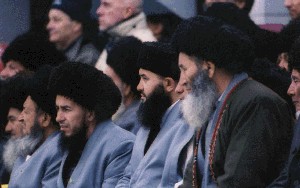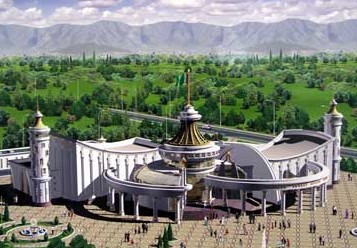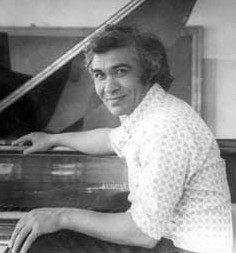Topic: Turkmen Culture
 All possible truth and revelation, all that our imperfect mind can comprehend is contained in living language at any moment of its existence. Being aware of it, any professional writer surrenders oneself to the word without looking back and only through the word comes to the sense and comprehension. It is not the author who creates the text, but the text creates the author getting over author’s inborn stagnation, or as specialists call it, “Maugly complex”. “The cart”, thanks to Allah, is always in front of “the horse”.
All possible truth and revelation, all that our imperfect mind can comprehend is contained in living language at any moment of its existence. Being aware of it, any professional writer surrenders oneself to the word without looking back and only through the word comes to the sense and comprehension. It is not the author who creates the text, but the text creates the author getting over author’s inborn stagnation, or as specialists call it, “Maugly complex”. “The cart”, thanks to Allah, is always in front of “the horse”. And now let’s extract from the element of the language three words that are key for our topic: Turkmenistan, Turkmens, Democracy.
“At first sight of the country it becomes clear that …”
It’s a good beginning, isn’t it? Anyway it’s “risk free”. An experienced PR-specialist will have no trouble in putting finish to it. I will stop at three dots, not because of clich? (trite expression) but by the reason of impossibility to discover Turkmenistan having looked at it just several times. Here are palaces, fountains, avenues! One can’t tear oneself from them, so wonderful they are. I’m talking about another thing. The question is about national way of life, about innocence and cordiality invisible to strange look. Non- prejudice is a rare, lucky gift. As for sinners like we are, we have to take away bedding of negative empiricist stratum after stratum for to name unselfish as unselfish, sincere as sincere, kind as kind. That we, at last, learn to interpret life in favor of life, as well as man in his favor. Should one manage to do so, one turn the next sight to oneself being accreted with the way of life of the country one tried to comprehend with a swoop.
That’s an astonishing thing. It’s astonishing so long as Turkmenistan is the text that creates both the author and the reader. In the composition plan of this transforming text all small-minded is blessed with indivisible logic far from vulgar, trivial determinism. I can add – arbitrary determinism for nobody knows its original cause. But we participate in the Most High’s intention and we comprehend whether our deeds conform to His intention.
Just this inward sense of some vertical line recognizes, in particular, invisible harmony of Turkmen Renaissance. Immediately after that one comprehends deep essence of national Renaissance with its wings extended on both sides of the time. Continuity is principal spiritual object of Turkmen. The past and the future closing up in the point of the present form the flight energy, exactly that vertical line …
Vertical line! If I were a poet I would call Turkmenistan “the fifth part of the world”. But I have another status so I will object to myself – construction of new being (existence) models is not peculiar to Turkmen mentality. And so in Turkmen view the past and the future are equal in rights. They interpret ideal things as satanic temptation, as original sin. Many years ago one old Turkmen men hardly speaking Russian won my heart by lapidare wording. I put it down.
“There is only one miracle – he said – it’s life. Allah created it. Another miracle may exist only in morbid mind”.
Isn’t it a solution of the nation’s ineradicable optimism, its inexhaustible tolerance? Turkmen can, and always could surrender to fate not waiting for another miracle except life. And they disposed of this gift in full. An outstanding archaeologist Viktor Sarianidi explains the phenomenon of unprecedented ethnic longevity of Turkmen this way: “They have a good ear for history. Think over – the culture where nothing disappears and nothing becomes old is at the same time an open system. Isn’t it staggering? Yes, it’s really staggering. One can be impressed by nation’s power that created immortal works of human soul and hands at the dawn of life. Ancient history calls seven miracles of the world amazing contemporaries with scope and splendor as well as human abilities equal to God’s ones. “Ak bugday (white grain)” can be easily referred to that list, can’t it? Thousands of years before “pendent gardens”, temples and colossus Turkmen forefathers sowed fields with white grain. After hard work they had a rest on the carpets woven by their wives, those carpets protected their houses from cold, heat and wind. Did ancient carpet-makers wish to amaze the world when they were making up complicated ornaments and binding thousands of many-colored yarn knots? Certainly, they did not. They had been creating the beauty for themselves and did not know that their handicraft would be kept in original condition in tens of centuries. Perfection can be achieved only through experience and customs when everything verified by hundreds of generation and therefore is absolutely expedient. Unique skill of Turkmen women will be the summit of colors, talent and mastery harmony both today and tomorrow and always.
At that far time wonderful Ahal-Teke horse first hoofed Turkmen land. Enemies didn’t bare invade a country of peaceful farmers, as they knew – it’s hard work to defeat a man who saddled the horse as fast as idea.
There are no beginning and no end to the world, and this world is being decorated with three great Turkmen miracles.
By the way, it was Viktor Sarianidi who brought into scientific use the notion of the fifth hearth of ancient civilizations – Margiane. The kingdom that he found in the delta of the Murgab river – the country of Margush four thousand years ago was one of the greatest cultural centers of the East. Nomadic power of Oguz-Han, Parfia, Empire of Great Seljuks announced about themselves much more later. Then there were long centuries of historical anabiosis . But anabiosis is not a death as well as it is not a dissolution in other ethnic groups. As if in fairy-tale Turkmen woke up (just 15 years ago) and took its only place between the East and the West.
Isn’t it incredible? Not at all. Turkmen simply can wait for, they can surrender to the need. Their natural democracy is philosophical throughout. There are no melancholic Turkmen as well as there are no bald Mexicans. Turkmen are definitely free. Policy of foreign dictation can’t be applied to them. Although they had been threatened with celestial punishment for 70 years, everyone from the Communist Party First Secretary to the simple farmer had been doing circumcision to their sons. It was neither act of heroism and challenge to the authority nor religious stoicism. It was calm, even serene self-realization under on principal invariable conditions. Turkmen democracy admits only dictate of need. Today and forever this need is sovereign state. State value is unquestionable for Turkmen. They express civil position through it. Turkmen are deaf to dictation but they are sensitive to authority. The West is not able to comprehend this subtlety as its democracy regenerates into dictate of consumption. Even freedom is an object of consumption here. They “sympathize” aggressively with those who receive less freedom according to the western standards. However, Turkmen are not consumers, they, figuratively speaking, inherit the freedom like they inherit hair and eyes colour. Of course, some of Oguz-Han offspring are far from being noble and high moral standards, but Turkmen proverb says – “let nobody know that your soul is black”. It’s a shame to be bad. Even black soul is ringing with honor imperative giving rise to morbid discord.
I believe that this state of affairs is genuine democracy. It’s just the contrary of the democracy of absurdity that includes, for example, right to be vicious. Society of identical individuals produces clones with set of consumer pretensions and full absence of cultural wealth. Personality becomes a black sheep. Social resonators of high idea and heartfelt word are being destroyed.
I write with a sense of bitterness as I’m sincerely attached to the west-eastern country I live in, to its people who deeply feel the catastrophic situation. Just this circumstance made me have a talk with editorial staff and readers – I argue with nobody as well as refute nobody. I can’t reproach myself in being engaged. Yes, I failed to avoid pathos, but it’s pathos of love and hope. Notes aim is modest – to understand myself, to interpret life in favor of life, to name unselfish as unselfish, sincere as sincere, kind as kind, and to call Turkmenistan – let me smile- the fifth part of the world. Let everyone tell this way about his holy land, everyone out of six billion world population.
Alexander MONAKHOV, Western Europe
“Turkmenistan” magazine (Moscow), ? 3, 2005
Posted by countryturkmenistan
at 12:16 PM

 March 31, 2005. Every child likes fairy tales, believes in all amazing transformations and wonders happened to the heroes, who take children into the journey and do great deeds in the name of the good and beauty, love and friendship. The main idea of the project for construction of the new building of the Turkmen State Puppet-Show Theatre is to built the fabulous castle of exciting adventures and mysteries where the heroes of various fairy tales will live inviting the children in the world of fantasy and creation.
March 31, 2005. Every child likes fairy tales, believes in all amazing transformations and wonders happened to the heroes, who take children into the journey and do great deeds in the name of the good and beauty, love and friendship. The main idea of the project for construction of the new building of the Turkmen State Puppet-Show Theatre is to built the fabulous castle of exciting adventures and mysteries where the heroes of various fairy tales will live inviting the children in the world of fantasy and creation.  "A PRICELESS PEARL IN TURKMEN ART TREASURY”
"A PRICELESS PEARL IN TURKMEN ART TREASURY”